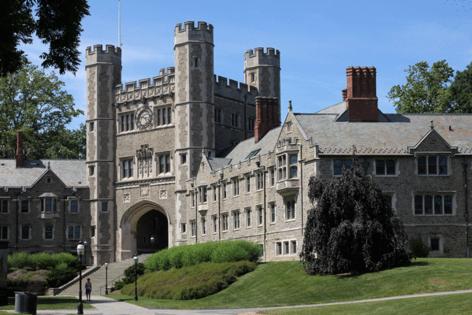Princeton hit with fund freeze as Trump widens college fight
Published in News & Features
Princeton University said U.S. government agencies have frozen several dozen research grants as President Donald Trump escalates his fight with elite American colleges.
The “full rationale” for the suspension isn’t clear, said Princeton President Chris Eisgruber, but he affirmed the school’s intention to combat antisemitism, which the White House has cited in its push to force change at other schools including Columbia and Harvard universities.
“If there’s an allegation that there’s some kind of unlawful behavior, we have to change that,” Eisgruber said Tuesday in an interview on campus with Bloomberg News. “We have to stand steadfastly against antisemitism and all other forms of discrimination, and we will cooperate with the government to address those if that’s their concern.”
The Trump administration is ramping up pressure on U.S. universities, which were roiled by pro-Palestinian student protests last year after the Oct. 7, 2023, attack by Hamas on Israel and the Jewish state’s retaliatory response in Gaza. The crackdown has stirred concern among faculty and students that the government is suppressing free speech and academic freedom, and risks damaging research and innovation.
Eisgruber, a constitutional lawyer and Princeton’s president since 2013, said the school will continue to “vigorously defend academic freedom and we will insist on the due process rights of the university.” He also spoke out in favor of free speech while cautioning that protests are still subject to limits.
“People have the right to articulate ideas, even if they are immoral, offensive or wrongheaded,” he said. “People can criticize me, they can criticize the government, they can say lots of other things on the campus, but it doesn’t mean that you can pitch tents in an encampment or, or take over a building, whether you’re in Washington DC or whether you’re on the Princeton University campus.”
On the funding freeze, Princeton said it received notifications from government agencies including the Energy Department, Defense Department and National Aeronautics and Space Administration.
Demands put on universities in order to continue their government research funding are “deeply worrisome,” Eisgruber said, adding that he’s concerned the attack on the institutions will leave the U.S. behind in scientific innovation after decades of successful collaboration.
“It has contributed tremendously to the prosperity, health and security of our country and that pact has depended on the idea that the American government will come to universities and ask them to do research that is in the interest of the American people,” Eisgruber said.
Princeton, a science powerhouse where faculty have won Nobel Prizes in physics and chemistry in recent years, was on a list of 60 colleges that the Education Department warned in March could face penalties pending investigations into their handling of allegations of antisemitism. The school, which had a $33.4 billion endowment as of June, received $455.8 million in government grants and contacts in 2024, according to its latest Report of the Treasurer.
The university on Tuesday it was considering selling $320 million of taxable bonds, which can be used for general purposes. Other top schools including the University of Pennsylvania and Stanford University have tapped debt markets amid various tax and funding risks.
The Trump administration said earlier this week it would scrutinize billions of dollars of federal funding at Harvard University. The review includes $8.7 billion in grants and $255.6 million in contracts, according to a statement from agencies including the Department of Education and the Department of Health and Human Services.
The administration in March froze $400 million in funding at Columbia, days after warning the school that it was reviewing the money as part of investigations into potential civil-rights violations. President Donald Trump has warned that he would stop “all federal funding” for any college or school that allows “illegal protests” and threatened to imprison or deport foreign students.
In recent weeks several students or former students have been detained by immigration agents, including Mahmoud Khalil, who led anti-Israel protests at Columbia, and Tufts University PhD student Rumeysa Ozturk, from Turkey, who was snatched off the street by plainclothes officers and has been sent to a facility in Louisiana.
Columbia has agreed to a list of demands to restore federal funding, including a ban on masks, expanded campus police powers and a review of its Middle East, South Asian and African studies department. That infuriated some faculty who saw it as capitulation.
Interim President Katrina Armstrong, meanwhile, abruptly stepped down last week to return to her role as chief executive officer of Columbia University’s Irving Medical Center, days after media reports that she downplayed the changes in a zoom meeting with faculty.
____
(With assistance from Sarah McGregor and Elizabeth Rembert.)
©2025 Bloomberg L.P. Visit bloomberg.com. Distributed by Tribune Content Agency, LLC.







Comments